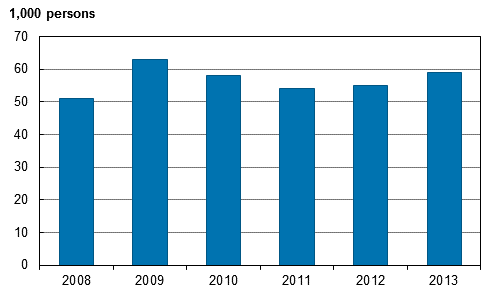5 Young people not working or studying
Because a majority of unemployed people aged 15 to 24 are students seeking part-time employment or summer jobs, in recent years we have, in addition to unemployment, also started monitoring the number of young people that are not working or studying. This Section describes young people who are not employed and have not participated in any type of education in four weeks before the Survey and who are not performing compulsory military service either.
The number of young people aged 15 to 24 who are not working or studying has varied between 51,000 and 64,000 from 2008 to 2014, and their share of all persons in the same age group has varied between eight to ten per cent (Figure 22). The shares of girls and boys have been close to one another. The changes in the numbers have reflected changes in the general employment situation. In 2008 to 2014, around three-quarters of these young people not working, studying or performing compulsory military service were aged 20 to 24. A majority of young people in this age group had completed upper secondary level education.Figure 22. Young people aged 15 to 24 that were not working, studying or performing compulsory military service in 2008 to 2014

In 2014, there were 64,000 young people that were not working, studying or performing compulsory military service. This was ten per cent of the entire 15 to 24 age group. Of them, nearly two-thirds considered themselves unemployed. Almost one-sixth reported that they were on disability pension or chronically ill. One in ten were caring for their children.
Young people that are not working, studying or performing compulsory military service consist of several different groups. Even though the clear majority considered themselves unemployed and the share of disabled persons was also high, the group as a whole does not, however, represent socially excluded persons or young people at risk of social exclusion. The number of young people that are not working, studying or performing compulsory military service has been highest during summer and at the turn of the year, which partially suggests that for many this is a short transitional period between studies, work or compulsory military service.
Source: Labour Force Survey 2014. Statistics Finland
Inquiries: Hanna Sutela 029 551 2907, Pertti Taskinen 029 551 2690, tyovoimatutkimus@stat.fi
Director in charge: Riitta Harala
Updated 28.4.2015
Official Statistics of Finland (OSF):
Labour force survey [e-publication].
ISSN=1798-7857. Employment and unemployment 2014,
5 Young people not working or studying
. Helsinki: Statistics Finland [referred: 12.4.2025].
Access method: http://stat.fi/til/tyti/2014/13/tyti_2014_13_2015-04-28_kat_005_en.html

